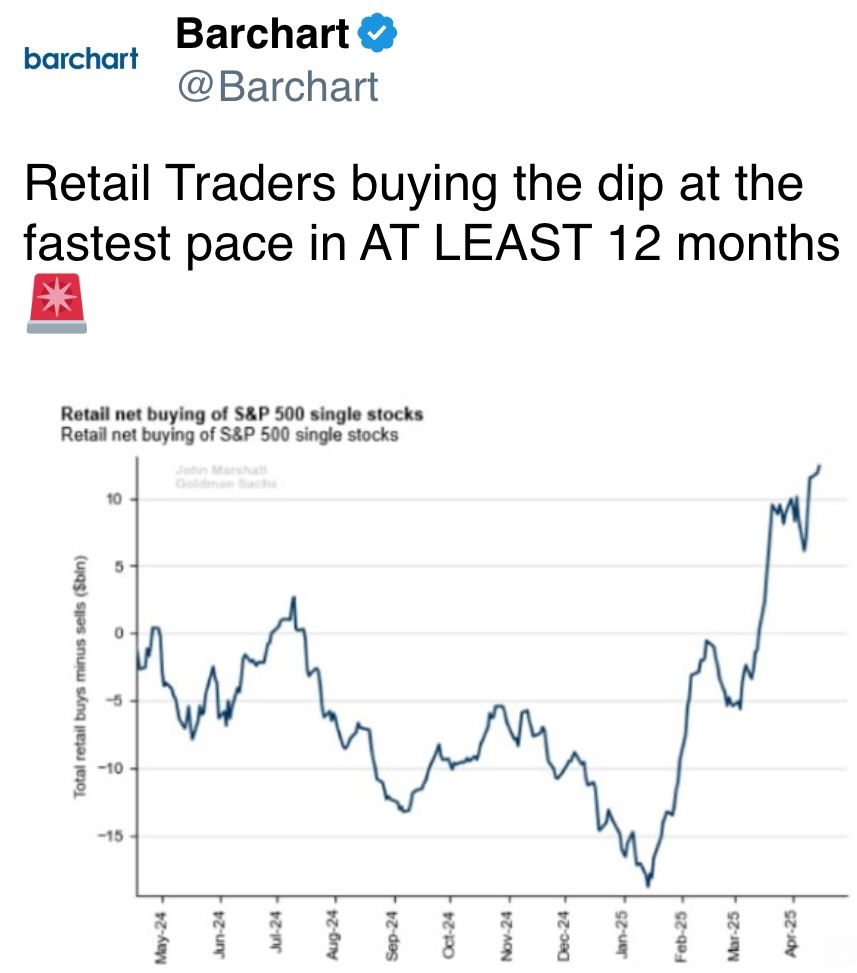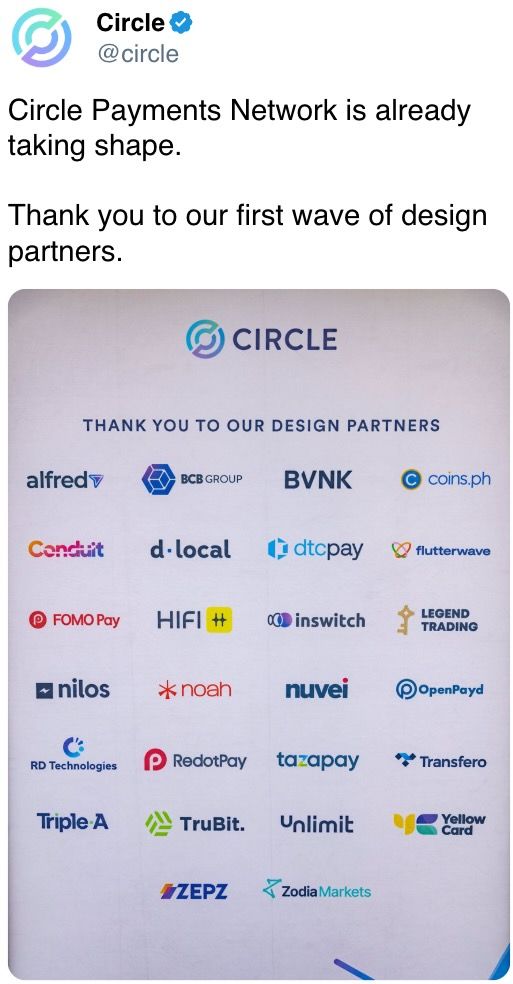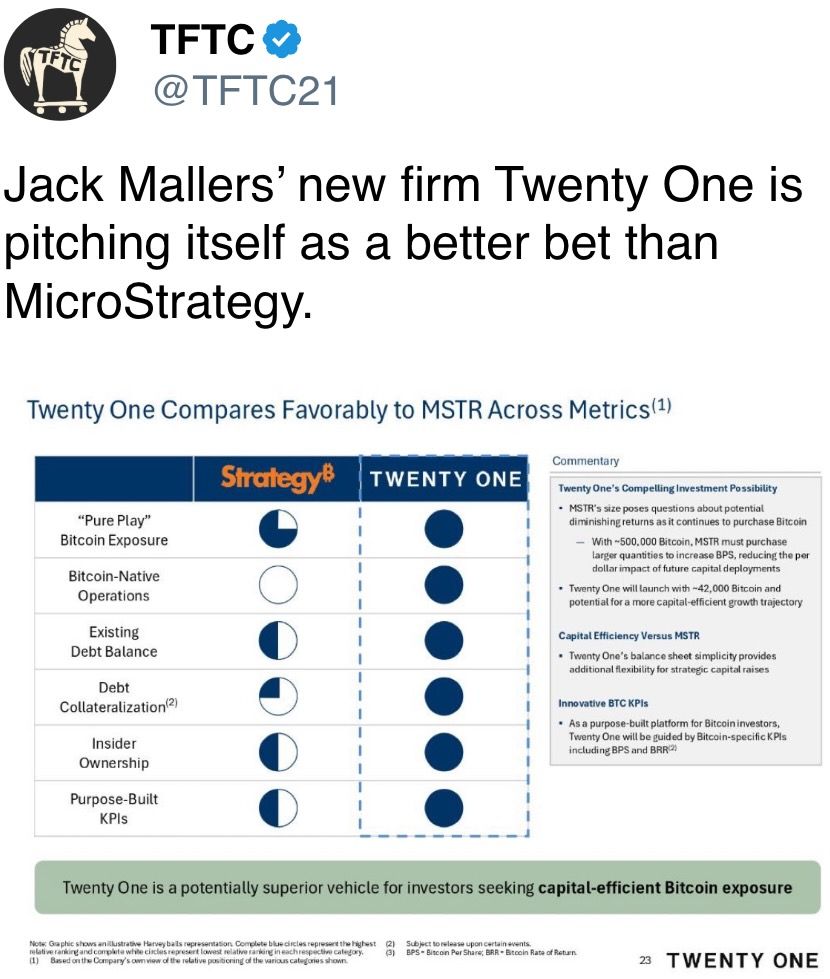Uncategorized
Crypto Daybook Americas: Bitcoin Dominance Underlines Haven Status as Trade Turmoil Hits Market

By Francisco Rodrigues (All times ET unless indicated otherwise)
Bitcoin’s (BTC) status as a haven in the context of broader financial markets may be up for debate, but within crypto it’s hardly questionable. Cryptocurrency prices have fallen across the board over the last 24 hours, yet bets on BTC’s dominance keep growing.
The market’s sell-off comes amid profit-taking and conflicting messages from the Trump administration over its trade war with China.
Those comments cooled a rally that started after President Donald Trump signaled he would not remove Federal Reserve Chair Jerome Powell and suggested a softer stance on trade with China. That helped the price of bitcoin to approach $95,000 before it dropped back to $92,200.
The pullback followed comments from Treasury Secretary Scott Bessent, who said there’s no unilateral plan to lift U.S. tariffs on Chinese goods, contradicting Trump’s suggestion that tariff rates could drop in the coming weeks. Investors struggled to interpret the policy direction as Trump also hinted at a “fair deal” with the world’s second-largest economy.
The uncertainty revealed a shift toward bitcoin in the crypto space. The broader CoinDesk 20 (CD20) index lost 3.75% of its value over the last 24 hours, compared with BTC’s 2% drop.
Institutional traders’ preference for BTC is shown by a Binance futures contract tracking the cryptocurrency’s dominance. It’s traded at a 76% premium for the one-year forward, indicating traders expect BTC to retain an edge over altcoins in the coming months, according to an emailed statement from Jake O., an OTC trader at Wintermute.
Options trading further illustrates this positioning. Large bets were placed on bitcoin hitting $110,000 by June, according to Jake O., with traders simultaneously selling calls at $140,000 and $170,000 for September and December — a calendar spread that signals short-term optimism and long-term caution.
Similar activity emerged in May $110,000 calls, where growing gamma exposure points to increasing sensitivity in the market to price swings. Still, long-term crypto holders remain unfazed as data shows they keep accumulating.
For now, the markets remain reactive to the signals coming out of Washington, which given their softer stance also led to a gold dropping to $3,350 per ounce from more than $3,500. Stay alert!
What to Watch
- Crypto:
- April 25, 1 p.m.: U.S. Securities and Exchange Commission (SEC) Crypto Task Force Roundtable on «Key Considerations for Crypto Custody«.
- April 28: Enjin Relaychain increases active validator slots to 25 from 15 to enhance decentralization.
- April 29, 1:05 a.m.: BNB Chain (BNB) — BSC mainnet hardfork.
- April 30, 9:30 a.m.: ProShares expects its XRP ETF, offering exposure through futures and swap agreements, to begin trading on NYSE Arca.
- April 30, 10:03 a.m.: Gnosis Chain (GNO), an Ethereum sister chain, will activate the Pectra hard fork on its mainnet at slot 21,405,696, epoch 1,337,856.
- Macro
- Day 4 of 6: World Bank (WB) and the International Monetary Fund (IMF) spring meetings in Washington.
- April 24, 8:30 a.m.: The U.S. Census Bureau releases March manufactured durable goods orders data.
- Durable Goods Orders MoM Est. 2% vs. Prev. 0.9%
- Durable Goods Orders Ex Defense MoM Est. 0.2% vs. Prev. 0.8%
- Durable Goods Orders Ex Transp MoM Est. 0.2% vs. Prev. 0.7%
- April 24, 8:30 a.m.: The U.S. Department of Labor releases unemployment insurance data for the week ended April 19.
- Initial Jobless Claims Est. 221K vs. Prev. 215K
- April 25, 10:00 a.m.: The University of Michigan releases (Final) April U.S. consumer sentiment data.
- Michigan Consumer Sentiment Est. 50.8 vs. Prev. 57
- Earnings (Estimates based on FactSet data)
Token Events
- Governance votes & calls
- Lido DAO is voting to extend its delegate incentivization program (DIP) through Q4 with a $225,000 LDO budget. Voting ends April 28.
- Uniswap DAO will vote on establishing a licensing and deployment framework for Uniswap v4 to accelerate its adoption across multiple chains. The proposal grants the Uniswap Foundation a blanket exemption to deploy v4 on any DAO-approved chain and gives the Uniswap Accountability Committee authority to update deployment records. Voting occurs April 24-April 30.
- April 24, 8 a.m.: Alchemy Pay to host an Ask Me Anything (AMA) session on its 2025 roadmap.
- April 24, 9 a.m.: IOTA to host an X spaces session on staking, validators and the mainnet launch.
- April 24, 8 a.m.: Ronin to host a town hall meeting.
- April 30, 12 p.m.: Helium to host a community call meeting.
- Unlocks
- April 30: Optimism (OP) to unlock 1.89% of its circulating supply worth $23.45 million.
- May 1: Sui (SUI) to unlock 2.28% of its circulating supply worth $221.99 million.
- May 1: ZetaChain (ZETA) to unlock 5.67% of its circulating supply worth $11.28 million.
- May 2: Ethena (ENA) to unlock 0.73% of its circulating supply worth $13.69 million.
- May 7: Kaspa (KAS) to unlock 0.56% of its circulating supply worth $13.91 million.
- May 9: Movement (MOVA) to unlock 2.04% of its circulating supply worth $11.33 million.
- Token Launches
- April 24: Initia (INIT) to be listed on Binance, CoinW, WEEX, KuCoin, MEXC and others.
- May 2: Binance to delist Alpaca Finance (ALPACA), PlayDapp (PDA), Viberate (VIB) and Wing Finance (WING).
- May 5: Sonic (S) to be listed on Kraken.
Conferences:
CoinDesk’s Consensus is taking place in Toronto on May 14-16. Use code DAYBOOK and save 15% on passes.
- Day 3 of 3: Money20/20 Asia (Bangkok)
- Day 2 of 2: Blockchain Forum 2025 (Moscow)
- Day 2 of 3: Semafor’s World Economy Summit 2025 (Washington)
- April 24: Bitwise’s Investor Day for Bitcoin Standard Corporations (New York)
- April 26: Crypto Vision Conference 2025 (Manilla)
- April 26-27: Harvard Blockchain in Action Conference (Cambridge, Mass.)
- April 27: N Crypto Conference 2025 (Kyiv)
- April 27-30: Web Summit Rio 2025
- April 28-29: Blockchain Disrupt 2025 (Dubai)
- April 28-29: Staking Summit Dubai
- April 29: El Salvador Digital Assets Summit 2025 (San Salvador, El Salvador)
- April 29: IFGS 2025 (London)
- April 30-May 1: TOKEN2049 (Dubai)
Token Talk
By Shaurya Malwa
- Infrared, a liquid staking platform on Berachain, late Wednesday introduced a points program to reward users before its token debuts in the third quarter.
- Points have no fixed supply and are earned through activities like staking or providing liquidity.
- Users earn points by contributing to Infrared’s liquidity vaults, providing liquidity on exchanges like Kodiak and BEX, or staking iBGT and iBERA tokens. Longer participation increases points.
- Infrared leads Berachain’s ecosystem with $1.5 billion in total value locked.
- The program includes retroactive rewards since Infrared’s February launch, and will run for about three months. Users can track points in real time on a dashboard, with additional rewards through partners like Pendle. Points will convert to Infrared’s native token at a ratio to be announced closer to the token launch.
Derivatives Positioning
- Notional open interest in bitcoin CME options has climbed to $5 billion, the most since November.
- Open interest in the CME futures has bounced to over $12 billion, but remains well below the December peak of $22.7 billion, pointing to persistent caution.
- BTC CME futures basis suggests the same, still hovering under an annualized 10%.
- On offshore exchanges, open interest in perpetual futures exchanges has dropped with the overnight BTC price pullback. This suggests the weakness is likely led by profit-taking rather than an influx of fresh shorts.
- In altcoins, NEAR, UNI and PEPE futures have seen the most increase in open interest in the past 24 hours.
- On Deribit, BTC, ETH skews continue to show a bias for calls across time frames. Traders are increasingly selling cash-secured put options tied to BTC, Lin Chen, Deribit’s business development head told CoinDesk.
Market Movements:
- BTC is down 1.36% from 4 p.m. ET Wednesday at $92,411.92 (24hrs: -1.76%)
- ETH is down 2.94% at $1,743.77 (24hrs: -2.66%)
- CoinDesk 20 is down 2.21% at 2,669.87 (24hrs: -3.02%)
- Ether CESR Composite Staking Rate is up 10 bps at 3.125%
- BTC funding rate is at 0.0069% (7.5873% annualized) on Binance

- DXY is down 0.45% at 99.40
- Gold is up 2.19% at $3,347.90/oz
- Silver is down 0.57% at $33.33/oz
- Nikkei 225 closed +0.49% at 35,039.15
- Hang Seng closed -0.74% at 21,909.76
- FTSE is down 0.3% at 8,378.12
- Euro Stoxx 50 is down 0.74% at 5,060.91
- DJIA closed on Wednesday +1.07% at 39,606.57
- S&P 500 closed +1.67% at 5,375.86
- Nasdaq closed +2.5% at 16,708.05
- S&P/TSX Composite Index closed +0.69% at 24,472.70
- S&P 40 Latin America closed +1.28% at 2,475.90
- U.S. 10-year Treasury rate is down 4 bps at 4.35%
- E-mini S&P 500 futures are down 0.62% at 5,368.00
- E-mini Nasdaq-100 futures are down 0.86% at 18,642.25
- E-mini Dow Jones Industrial Average Index futures are down 0.68% at 39,503.00
Bitcoin Stats:
- BTC Dominance: 64.56 (0.22%)
- Ethereum to bitcoin ratio: 0.01884 (-1.72%)
- Hashrate (seven-day moving average): 823 EH/s
- Hashprice (spot): $48.61
- Total Fees: 11.29 BTC / $1,042,496
- CME Futures Open Interest: 140,610 BTC
- BTC priced in gold: 27.8 oz
- BTC vs gold market cap: 7.92%
Technical Analysis

- The chart shows XRP, currently at $2.15, remains stuck in a downtrend that began in January.
- The Ichimoku cloud is capping the upside, threatening to derail the recovery rally seen since April 7.
- The immediate support is at $2, followed by the month’s lows near $1.60.
- On the higher side, the cloud and the descending trendline are levels to beat for the bulls.
Crypto Equities
- Strategy (MSTR): closed on Wednesday at $345.73 (+0.79%), down 1.85% at $339.33 in pre-market
- Coinbase Global (COIN): closed at $194.80 (+2.53%), down 1.53% at $191.82
- Galaxy Digital Holdings (GLXY): closed at C$18.73 (+2.86%)
- MARA Holdings (MARA): closed at $14.13 (+0.5%), down 2.55% at $13.77
- Riot Platforms (RIOT): closed at $7.50 (+5.34%), down 2.4% at $7.32
- Core Scientific (CORZ): closed at $7.12 (+2.89%), down 1.12% at $7.04
- CleanSpark (CLSK): closed at $8.87 (+1.14%), down 1.92% at $8.70
- CoinShares Valkyrie Bitcoin Miners ETF (WGMI): closed at $13.51 (+3.13%), down 2.59% at $13.16
- Semler Scientific (SMLR): closed at $34.28 (+3%), down 1.6% at $33.73
- Exodus Movement (EXOD): closed at $44.09 (+12.5%), up 0.7% at $44.40
ETF Flows
Spot BTC ETFs:
- Daily net flow: $917 million
- Cumulative net flows: $37.68 billion
- Total BTC holdings ~ 1.13 million
Spot ETH ETFs
- Daily net flow: -$23.9 million
- Cumulative net flows: $2.25 billion
- Total ETH holdings ~ 3.33 million
Source: Farside Investors
Overnight Flows

Chart of the Day

- The chart shows the dollar value of the number of active or open ether options contracts on Deribit.
- The $2,000 strike call is the most popular bet, with an open interest of over $260 million.
- Strikes with large open interest often act as magnets, meaning ether could rise to $2,000 in the coming days.
While You Were Sleeping
- Russia Reserves Right to Use Nuclear Arms in Event of Western Aggression — Shoigu (TASS News Agency): Russia’s Security Council secretary warned that the country’s defense policy permits a nuclear response to conventional attacks, including when foreign powers offer support through territory or logistics.
- Why Gold Became the Safe Haven of Choice as U.S. Treasuries and Dollar Sold Off (CNBC): Analysts attribute gold’s strength to its inflation-hedging appeal, insulation from fiscal and monetary policy, a weaker dollar and strong buying by emerging market central banks.
- Bitcoin’s April Rally Driven by Institutions, While Retail Flees ETFs: Coinbase Exec (CoinDesk): Bitcoin’s surge to $93,000 has been driven by institutional and sovereign wealth fund accumulation, not retail ETF flows, according to Coinbase Institutional’s John D’Agostino.
- The Dollar Has Further to Fall (Financial Times): Goldman’s chief economist says the dollar is overvalued by historical standards and a cooling U.S. economy will curb foreign appetite for American assets, weakening demand for the currency.
- Bitcoin Traders Eye Long Term BTC Accumulation by Selling Put Options
(CoinDesk): Traders are using a cash-secured approach by holding stablecoins, ensuring they can buy bitcoin if prices drop and puts are exercised at the higher strike price. - Long-Term Bitcoin Holders Show Commitment, Buy More BTC Than Short-Term Holders Sell (CoinDesk): Long-term investors’ holdings have increased by 635,340 BTC since January, absorbing more than what’s been distributed by short-term holders at a 1.38:1 accumulation ratio.
In the Ether





Uncategorized
XRP Price Surges After V-Shaped Recovery, Targets $3.40

Global economic tensions and regulatory developments continue to influence XRP’s price action, with the digital asset showing remarkable resilience despite recent volatility.
After experiencing a significant dip to $2.307 on high volume, XRP has established an upward trajectory with a series of higher lows, suggesting continued momentum as it approaches resistance levels.
Technical indicators point to a potential bullish breakout, with multiple analysts highlighting critical support at $2.35-$2.40 that must hold for upward continuation.
Technical Analysis Highlights
- Price experienced a 3.76% range ($2.307-$2.396) over 24 hours with a sharp sell-off at 16:00 dropping to $2.307 on high volume (77.9M).
- Strong support emerged at $2.32 level with buyers stepping in during high-volume periods, particularly during the 13:00-14:00 recovery.
- Asset established upward trajectory, forming higher lows from the bottom, with resistance around $2.39 tested during 07:00 session.
- In the last hour, XRP climbed from $2.358 to $2.368, representing a 0.42% gain with notable volume spikes at 01:52 and 01:55.
- Price surged past resistance at $2.36 to reach $2.366, later establishing new local highs at $2.369 during 02:03 session on substantial volume (539,987).
- Currently maintaining strength above $2.368 support level with decreasing volatility suggesting potential continuation of upward trajectory.
Disclaimer: This article was generated with AI tools and reviewed by our editorial team to ensure accuracy and adherence to our standards. For more information, see CoinDesk’s full AI Policy. This article may include information from external sources, which are listed below when applicable.
External References
- «XRP price path to $3.40 remains intact — Here is why«, Cointelegraph, published May 16, 2025.
- «XRP Price Watch: Bulls Eye $2.60 as Long-Term Trend Holds«, Bitcoin.com News, published May 17, 2025.
- «XRP Price Explosion To $5.9: Current Consolidation Won’t Stop XRP From Growing«, NewsBTC, published May 17, 2025.
Uncategorized
SUI Surges After Finding Strong Support at $3.75 Level

Global economic tensions and shifting trade policies continue to influence cryptocurrency markets, with SUI showing particular resilience.
The asset established a trading range of 4.46% between $3.70 and $3.86, finding strong volume support at the $3.755 level.
A notable bullish momentum emerged with price surging 1.9% on above-average volume, establishing resistance at $3.850.
The formation of higher lows throughout the latter part of the day suggests consolidation above the $3.775 support level.
Technical Analysis Highlights
- SUI established a 24-hour trading range of 0.165 (4.46%) between the low of 3.700 and high of 3.862.
- Strong volume support emerged at the 3.755 level during hours 17-18, with accumulation exceeding the 24-hour volume average by 45%.
- Notable bullish momentum occurred in the 20:00 hour with price surging 7.2 cents (1.9%) on above-average volume.
- Resistance established at 3.850 with higher lows forming throughout the latter part of the day.
- Decreasing volatility in the final hours suggests consolidation above the 3.775 support level.
- Significant buyer interest appeared between 01:27-01:30, forming a strong support zone at 3.756-3.760 with exceptionally high volume (over 300,000 units per minute).
- Decisive bullish reversal began at 01:42, establishing a series of higher lows and higher highs.
- Breakout above 3.780 occurred at 01:55, followed by consolidation near 3.785 with decreasing volume.
Disclaimer: This article was generated with AI tools and reviewed by our editorial team to ensure accuracy and adherence to our standards. For more information, see CoinDesk’s full AI Policy. This article may include information from external sources, which are listed below when applicable.
External References
- «Sui price up 5.16% intra-day: bullish structure remains strong«, crypto.news, published May 16, 2205.
- «SUI Set to Explode, But Don’t Sleep on XRP and Other Altcoins«, CoinPedia, May 16, 2025.
Uncategorized
Dogecoin (DOGE) Whales Accumulate 1 Billion DOGE Amid Critical Support Formation

Geopolitical tensions and evolving trade policies continue to influence cryptocurrency markets, with Dogecoin showing resilience amid broader economic uncertainty.
Despite macroeconomic headwinds, DOGE has maintained support above key moving averages while forming a potential bull flag pattern that could target $0.35 if validated by continued buying pressure.
Technical Analysis Highlights
- DOGE experienced significant volatility with a 4.3% range (0.211-0.220) over the past 24 hours, forming a key support zone around 0.212 validated by high volume rebounds at 13:00 and 22:00.
- The price action reveals a bullish recovery pattern from the 16:00 low, with resistance emerging at 0.217-0.220.
- The 20:00 candle’s strong volume surge above the 24-hour average confirms renewed buying interest, suggesting potential upward momentum if DOGE can maintain its position above the established support level.
- In the past hour, DOGE has demonstrated significant bullish momentum, climbing from 0.215 to 0.216 with notable volume spikes at 01:17, 01:21, and 01:54-01:55.
- The price established a strong support zone around 0.215 during the early minutes, followed by a decisive breakout at 01:16-01:17 where volume surged over 8 million.
- The uptrend continued with higher lows forming a clear ascending pattern, culminating in a new resistance test at 0.216-0.217 range.
- The final minutes saw particularly heavy trading activity with volumes exceeding 7 million at 02:01-02:02, confirming strong buyer interest and suggesting potential for further upside movement.
Disclaimer: This article was generated with AI tools and reviewed by our editorial team to ensure accuracy and adherence to our standards. For more information, see CoinDesk’s full AI Policy. This article may include information from external sources, which are listed below when applicable.
External References
- «Dogecoin Eyes $0.35 as Whale Accumulation Signals Bull Flag Breakout«, The Crypto Basic, published May 16, 2025.
- «Dogecoin Hovers at $0.22 Following Weeks of Gains, Analysts Share Mixed Outlooks«, NewsBTC, published May 17, 2025.
-

 Fashion7 месяцев ago
Fashion7 месяцев agoThese \’90s fashion trends are making a comeback in 2017
-

 Entertainment7 месяцев ago
Entertainment7 месяцев agoThe final 6 \’Game of Thrones\’ episodes might feel like a full season
-

 Fashion7 месяцев ago
Fashion7 месяцев agoAccording to Dior Couture, this taboo fashion accessory is back
-

 Entertainment7 месяцев ago
Entertainment7 месяцев agoThe old and New Edition cast comes together to perform
-

 Business7 месяцев ago
Business7 месяцев agoUber and Lyft are finally available in all of New York State
-

 Sports7 месяцев ago
Sports7 месяцев agoPhillies\’ Aaron Altherr makes mind-boggling barehanded play
-

 Entertainment7 месяцев ago
Entertainment7 месяцев agoDisney\’s live-action Aladdin finally finds its stars
-

 Sports7 месяцев ago
Sports7 месяцев agoSteph Curry finally got the contract he deserves from the Warriors





